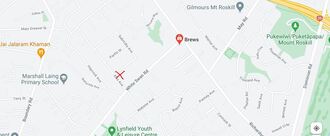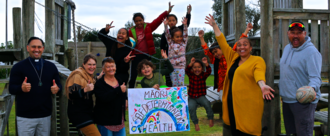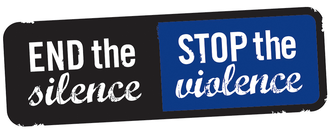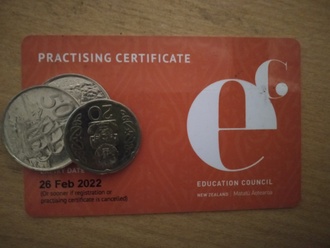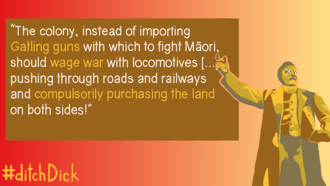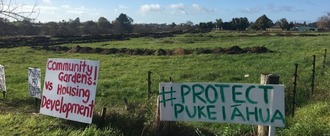-
Update the Hamilton City Emblem!The current emblem was introduced in 1946 and represents the colonial history of our city as a settler military post in the 19th century. It does not align with the Treaty of Waitangi and Maaori representation in our current emblem is non-existent. Our emblem does not depict any partnerships and the crown is the main overpowering feature in the emblem. It does not hold any in-depth cultural, metaphorical or traditional meanings and is an emblem that was introduced almost 100 years ago!!! Kirikiriroa means 'long strip of cultivated land' and it represents the abundance of people who shared, took care, and lived off the land before colonisation. Gradually, like our city name or street names around our city Hamilton was overpowered by European settlers who made Kirikiriroa their own. Updating our city emblem and discussing it's relevance is important because it currently represents and supports years of our city’s colonial, traumatic history where indigenous people had land taken, were oppressed, and even murdered. Some people might think something small like an emblem doesn't matter, but the history and significance behind something so small has been the meaning of life or death for many. Today, Hamilton is the youngest city in New Zealand and one of the most multicultural cities with more than 160 ethnicities. We are a vibrant young & developing city and we need an emblem that reflects this! We want an emblem that we are proud of. We want an emblem that we understand and can relate to. We want an emblem that represents maaori, our city, and our diverse multicultural population. We want our city emblem to represent 'Kirikiriroa'. We want to have an emblem that we can share with pride! Sign to call on our Council to update City Emblem! To be able to present the petition the Council requires over 150 signatures with postal addresses, to show signatories are residents. Your address will be supplied to Council but not be made public.455 of 500 SignaturesCreated by Jahvaya Wheki
-
Label country of origin meat productsUnder public pressure our laws and standards have improved so the treatment of farmed animals in Aotearoa is more transparent and accountable. For example the use of sow crates for mother pigs was banned in 2010 but farrowing crates are still used. However overseas products don't have the same standards. They can have issues around contamination of local water supplies, routine use of antibiotics in feed, and poor animal welfare. The law is being updated this year to make country of labelling compulsory. Yet imported products which may have been processed in Aotearoa will still be allowed to be mixed with NZ produce and labelled 'Made in New Zealand'. Over 80 percent of New Zealanders believe it is misleading if imported pork which undergoes further processing in New Zealand, is not labelled as imported. Almost 60 percent of pork eaten in New Zealand is imported. Pig farmers here are making welfare improvements yet say they are 'competing against a wall of imported pork meat'. Without accurate labelling consumers are unable to make a choice that supports our farmers and animal welfare. Let's remove the loopholes and make sure country of labelling is accurate. References https://www.rnz.co.nz/news/national/377123/country-of-origin-label-now-compulsory-on-some-foods https://www.stuff.co.nz/business/124539599/pork-products-slip-through-country-of-origin-labelling-loophole https://www.newshub.co.nz/home/rural/2020/12/government-to-phase-out-use-of-farrowing-crates-in-pork-farming-by-2025.html https://www.nzherald.co.nz/nz/pig-farmers-hope-ban-on-sow-stalls-will-buy-loyalty/PDN5RCI7CCGV2F3I43GUPFOZME/36 of 100 SignaturesCreated by Anita Taylor
-
Support Vaccines for People Not ProfitBased on current Covid vaccine supply projections, 9 out of 10 people in low-income developing countries won't get a vaccine in 2021. WTO rules allow pharmaceutical companies to enforce intellectual property rules like patents on their vaccines, blocking other manufacturers from producing the vaccine. This artificially restricts the supply of vaccines, driving up prices. In March, Aotearoa New Zealand should support the South African and Indian proposal at the World Trade Organisation to temporarily relax these rules for Covid-19 vaccines, so other manufacturers can increase global vaccine production and bring down prices. Currently wealthy countries are hoarding the limited supply of vaccine doses. Developing countries face a diminished allocation of vaccine doses, and a much longer pandemic. · This is unfair: access to life-saving equipment and medicines should not be based on who can pay; it should be based on need. · It is unsafe: delays on vaccinations around the world could leave us all unsafe. The virus, left to reproduce, will continue to mutate. · The free-for-all in buying up vaccines is exploitative: individuals and communities in developing countries have contributed to trials and are now being abandoned. · It will entrench global inequality: while wealthy countries get vaccines first, and their economies are able to open up, developing countries will still be fighting the pandemic. · Delaying worldwide vaccination will harm the global economy. A new study commissioned by the ICC Research Foundation found that the global economy could lose up to US$9.2 trillion if developing economies are denied access to Covid-19 vaccines. For more information on the People´s Vaccine and the South African and Indian proposal at the WTO, check out our article in The Spinoff: https://thespinoff.co.nz/society/29-01-2021/new-zealand-needs-to-get-on-board-the-peoples-vaccine/1,874 of 2,000 SignaturesCreated by NZ Alternative .
-
Enable sustainable community focused housing over disconnected housing developmentsOur concerns aren't isolated but sit amongst a greater context of unease. Other communities in Christchurch are confronted with the same problems and concerns as ourselves, e.g. We are affiliated with groups around the country who advocate for community focused housing including; https://www.commonground.net.nz/?r_done=1 Our shared vision is thriving communities of connected people in healthy ecosystems within a vibrant local economy. Many people who hold this neighbourhood dear to their hearts are community builders who work at creating more connections between people. What we propose is the possibility of being intentional with the design of 74 Domain Terrace. It is possible to design a housing development that creates a diverse community attractive to people from a range of ages with a variety of skills and strengths. This has the possibility of becoming an “intentional community’ where members/residents communicate with and care for each other. Such a community would be inclusive of all and everyone’s needs. The elderly need not feel isolated, and young families could experience support around them for raising children in a whanau friendly environment. Imagine creating a village to wrap around our children and the most vulnerable. Our environmental concerns are just as important to developing a flourishing community as our concerns for people. Care for the land on which we live is integral to our goals. Hence our plea for the trees and the ecological communities that they sustain. Dr Colin Merck, locally renowned ecological scientist, has conducted urban biodiversity studies in this area. https://www.linkedin.com/in/colin-meurk-1284329/?originalSubdomain=nz The trees make a significant contribution to an unusually diverse range of bird life. Local residents, some seasonal, include little owls, kingfishers, bellbirds, fantails, grey warblers, paradise ducks, greenfinches, chaffinches, magpies, spur winged plovers as well as a large population of blackbirds and more common varieties like the sparrow, thrush and starling. Not forgetting the much-loved Avon hybrid ducks. The topsoil of 74 Domain Terrace is precious. The property was originally a chicken farm. The soil has never been turned or sprayed. It has supported a range of animals for many decades. Most recently horses, sheep, free range chickens and rabbits. As such it is extremely fertile and likely to be supporting populations of the foot long native worm and leaf veined slugs as does the adjoining property at 80 Domain Terrace. To leave this taonga solely in the hands of developers is to sign a death warrant for so much. Within 24 hours of the auction an arborist entered the property, without the permission of the residents, to establish a quote for the removal of the trees. The loss of the trees will have a huge impact on the local environment and community. Without these particular trees, in which they currently roost, the little owls are unlikely to relocate and will inevitably die. IT is these trees that resulted in Domain Terrace being nominated as one of the ten most beautiful autumn streets in the city. Destruction of the trees on this prominent bend would destroy the whole ambience of the street and the balance of vegetation between The Domain and privately owned land. As with all similar developments the topsoil will be excavated and stripped depriving the property of an entire ecosystem. Most importantly what will die is POSSIBILITY. The possibility of developing housing solutions in partnership with diverse stakeholders that meet the social, ecological, cultural, and economic needs of the people living there. Our desire is to have the housing company discuss their plans with the community and collaborate on what type of development best contributes to creating a sense of connection and wellbeing within the community. If the housing company can’t see sufficient profit from plans that meet the community’s needs a collective of residents is willing to buy the property back at cost price and become the principal actors of the change they want to see happening democratically in their neighbourhood. Sign our petition to have our voices heard by the Christchurch City Council. Help stop the development that threatens our neighbourhood character and values. Help bring forth a true community focused sustainable housing alternative from the competitive housing crisis which builds up the inequalities that ravage our country. PLEASE SIGN OUR PETITION! https://our.actionstation.org.nz/petitions/community-focused-housing-on-domain-tce Watch this space! It is our intention to oppose similar disconnected housing developments in the area in our quest for a more workable, holistic living environment for all our residents.289 of 300 SignaturesCreated by ANTOINE HOULE
-
Tairawhiti support for the establishment of Māori WardsWhanau and friends of Tūranga-nui-a-Kiwa/Gisborne invite you to sign this petition to show you care about meaningful and effective Māori/Pākehā partnership in local government in Aotearoa. Recently the GDC voted unanimously to establish Māori wards. http://www.gisborneherald.co.nz/local-news/20201124/maori-wards/ Historically Māori have not had fair representation at the decision-making table. We now have an opportunity to have equitable Māori representation at a local government level. However, there is a racist clause in legislation. If 5% of registered voters decide they don't want Māori wards, the GDC will be forced into a referendum which will cost our community thousands and will impact the mana of our community. While those against this are gathering momentum to block the establishment of the Ward we can counter the spread of racist ideology through the aroha in this petition. We are a small group of Pakeha, everyday citizens who want to provide support to our Treaty partners and encourage others to do the same. We acknowledge the hard mahi of Tangata Whenua and locals who have been fighting for the establishment of Māori wards. We hope this petition can tautoko te mahi and let you know we are with you. Please sign this petition to show the GDC and councils nationwide that we support the establishment of a Māori Ward and value on-going work of building relationships with our Māori community!712 of 800 SignaturesCreated by Aimee Milne
-
No Bottle Store on Ellis AvenueAlcohol Healthwatch estimates alcohol-related harm in New Zealand costs $14.5m each day. The brunt is disproportionately on youth, Maori and Pasifika in our communities, and there is a link between high density of off-licences and the heavier drinking patterns that result in much of the harm. Harm includes the health of the drinker themselves, such as increased rates of cancer and fetal alcohol syndrome, as well as harm to others, with alcohol playing a direct or indirect role in many fire fatalities, drownings, suicide and self-inflicted harm deaths, and the growing road toll. 43% of all alcohol is sold from off-licences, like the one proposed. This new bottle store would increase the amount of alcohol in our community when we need to limit supply, and in particular reduce sales from off-licences where the liquor is then consumed in unsupervised circumstances (in contrast with on-licences). Local schools and parks end up vandalised and littered with broken glass, as people drink alcohol purchased at bottle shops in public despite liquor bans. Resources of both council and schools have to be used to clean up the mess, when some of it could be avoided by reducing the sale of alcohol in the area. Finally, the District Licensing Committee process allows people to make submissions to object to the application, and this petition is an important opportunity for those who can't make a submission to still be able to show their opposition. It is possible there will also be a hearing on this application, particularly if the petition is signed by a lot of locals, which will provide another opportunity for the local community to have a say.240 of 300 SignaturesCreated by Julie Fairey
-
Māori self-determination for HealthPlease refer to our video documenting delivery of this petition here: https://www.youtube.com/watch?v=_662YzLuZMA&feature=emb_logo At this time of the covid virus we can be especially thankful that our publicly funded health system in Aotearoa New Zealand is among the best in the world. However the health system doesn't work the same for everyone. Māori whānau and communities are treated unfairly in the current model and experience severe and persistent health inequities. A fair society means everyone participates in enhancing our social, economic and educational activities, which builds collective confidence and safety. We all benefit in a fair society that is more prosperous and harmonious. https://youtu.be/sFlM5B008Ts More Videos: https://www.youtube.com/channel/UC2v0dLjHVJL1UqCe7T-n3WQ Māori kids and adults visit a health professional the same as or more than non-Māori. Yet the outcomes across the population are different. For example, Māori women are dying at two times the rate as non-Māori from breast cancer, four times in cervical cancer and five times more in lung cancer. The recommendation of 10 of 12 health experts who were tasked with a two year investigation of unfairness in our health system and how to address this, concluded a Māori Health Authority with commissioning rights was the best approach. This means an Authority that will have the autonomy to control, make decisions, and determine how to spend health dollars most appropriately for Māori. In order to provide the same high outcome for everyone our health system needs to be informed by Māori needs and Māori decision making. Māori must be able to enact rangatiratanga (self determination) to best meet the needs of their own communities. Such an approach will result in diverse options for everyone. For example, a Mātauranga Māori commissioning frame recognises the inseparability of health, education, environment, income, and civic responsibilities. This world-leading approach honours Te Tiriti o Waitangi which lays out terms of settlement. Te Tiriti is how we achieve a society where improved health is protected for every person, whānau, and social group regardless of social advantage and disadvantage. Though the government has accepted the creation of a Māori Health Authority, they rejected commissioning rights for the Authority. Without commissioning rights, the Māori Health Authority is subordinate to the Crown's representative, the Ministry of Health. Add your name today to call on our government to give Māori commissioning to the Māori Health Authority and ensure equal health outcomes for everyone in Aotearoa. **** References The New Zealand Health and Disability System Review https://systemreview.health.govt.nz/ "We have now some quite good evidence that racism at a range of levels does determine access, experience and outcomes in the healthcare system." Dr Ashley Blomfield, to the Waitangi Tribunal in 2018 Racist health system no cure for sick Māori, July 2019 https://www.stuff.co.nz/national/health/113917099/racist-health-system-no-cure-for-sick-maori 'We have totally failed': Rheumatic fever: The Third World disease entrenched in New Zealand, Aug 2020 https://www.stuff.co.nz/national/health/122260447/we-have-totally-failed-rheumatic-fever-the-third-world-disease-entrenched-in-new-zealand National Urban Māori Authority calls for Māori self-determination in health https://www.stuff.co.nz/auckland/300036653/national-urban-mori-authority-calls-for-mori-selfdetermination-in-health Māori should have a stand-alone health system https://www.facebook.com/TeAoMaoriNews/videos/3592536994197158 Public Health Association calls for the Minister of Health to intervene and support the Māori Health Authority alternative commissioning framework https://www.nzdoctor.co.nz/article/undoctored/public-health-association-calls-minister-health-intervene-and-support-maori1,688 of 2,000 SignaturesCreated by Emily Gill
-
Be Courageous: Support the establishment of a Māori WardFamilies and friends of Taranaki invite you to sign this petition to show you care about meaningful and effective Māori/Pākehā partnership in local government in Aotearoa. This is about Aroha. Aroha to direct one’s essence, energy to another person, place or object. Aro to direct Ha our essence, our energy, our breath. In July, New Plymouth District Council’s Elected Members made an impassioned stand for better representation for Māori around our Council table by voting to establish a Māori Ward at the 2022 local elections. These councillors challenged the severely broken legislation that places roadblocks in the way of Māori representation. This demonstration of collective aroha shown by New Plymouth councillors reflects the genuine voice of our community, 180 years after entering into partnership under the Treaty of Waitangi, New Zealanders want to see relationships honoured and friendships with tangata whenua nurtured better. It will only take 2874 signatures for those against the Māori Ward in New Plymouth to succeed in calling a referendum to uphold the racist status quo. Councils nationwide face this same issue. While those against the Māori Ward are gathering momentum to block the establishment of the Ward we can counter the spread of racist ideology through the aroha in this petition. We call on the binding power of aroha to show up and be heard. Aroha is more than just love, it directs our energy, grows that potential and binds us to someone or something. Please sign this petition to show the NPDC and councils nationwide that we support the establishment of a Māori Ward and value on-going work of building relationships with our Māori community! ----- For resources to help us have those prickly conversations with aroha and kindness click here - https://www.facebook.com/kinaconvos (shot Kina Convos!)3,245 of 4,000 SignaturesCreated by Rongomou Community Action ❤✊✌

-
End Teen ViolenceOur aim is to raise awareness, educate children in schools and talk about this issue so that we can provide help for those who have experienced or are going through violence, and hopefully prevent it too. We believe that this issue needs to be talked and normalised in conversations at schools because this issue is prevalent, and is hurting our youth. Violence is rooted from several factors, such as systematic poverty, family issues, experiencing violence at home and many more. Research shows that teen violence is more prevalent in Maori and Pasifika youth. Although the numbers have decreased, the seriousness of the offences still remain high. "...the reduction in offending rates for European and other ethnicities far outstripped young Pasifika and Maori, who dropped by 61% and 59%...Youth offending in the European/other category fell by 74%". [https://www.newshub.co.nz/home/new-zealand/2018/04/youth-crime-rates-decline.html] For many of us it affects us personally where families have lost their children to teen violence190 of 200 SignaturesCreated by End Teen Violence
-
The Teaching Council must be reviewedThe purpose of the Teaching Council is to ensure safe and high-quality leadership, teaching and learning for children and young people in early childhood, primary and senior secondary schooling in English medium and Maori medium settings through raising the status of the profession. Over 30,000 people called on the Teaching Council to review their decision to raise registration fees.[1]. Teachers who were unhappy with the decision and the communication from the Teaching Council include people who teach at early childhood, primary and secondary and include part-time and assistant teachers. The petition was delivered to Lesley Hoskin and the Teaching Council on 10 June 2020. A resolution has not been achieved so we now seek action with the Minister of Education. We believe the Teaching Council does not represent teachers' best interests. Teachers have lost trust and confidence (as highlighted by the PPTA 95% vote of no confidence).[2] The Teaching Council's duties need to be independently examined to determine whether they support and work for teachers. The review should include a review of its expenses and the level of registration fees charged to teachers. This is why we're calling on the Minister of Education Chris Hipkins to launch a review into the Teaching Council on behalf of the teaching sector. Sign now to join the call. This petition is led by teachers. References: 1. Say no to doubling teacher registration fees, OurActionStation https://our.actionstation.org.nz/petitions/fight-against-doubling-to-teacher-registration-fees 2. Teachers vote no confidence in Teaching Council over fee increase, RNZ, June 2020 https://www.rnz.co.nz/news/national/418585/teachers-vote-no-confidence-in-teaching-council-over-fee-increase11,077 of 15,000 SignaturesCreated by Anna Hamilton
-
Remove the Statue of Dick Seddon from Parliament Lawn“A nation reveals itself not only by the men it produces but also by the men it honours, the men it remembers.” - John F. Kennedy #DitchDick is a campaign petitioning the New Zealand government to remove and replace the statute of Richard “King Dick” Seddon which currently stands in front of the New Zealand Parliament Buildings. Dick Seddon was an established and notorious autocrat, imperialist and racist, and his beliefs are totally incompatible with the values of Aotearoa New Zealand as a just and modern nation. Seddon actively opposed the enfranchisement of women, supported racist policy against Chinese people, supported widespread confiscations and coercive purchase of Māori land and attempted to invade and annex the Pacific nations of Fiji, Sāmoa and the Cook Islands, succeeding in the latter. We call upon the government to relegate Richard Seddon to the history books and no longer honour him with pride of place in front of the highest legislative body in the nation. Seddon’s abhorrent words and deeds have no place in modern New Zealand, and there are many other great Kiwis who deserve the coveted place on Parliament lawn far more than he. References and further reading: -Grimshaw, Patricia. Women's Suffrage in New Zealand. Auckland University Press/Oxford University Press, 1972. xx, 151 pp. -Scott, Dick (1975). Ask That Mountain: The Story of Parihaka. Heinemann. -Burdon, Randal Mathews (1966)."Seddon, Richard John". In McLintock, A.H. (ed.). An Encyclopaedia of New Zealand.453 of 500 SignaturesCreated by Nikau Wi Neera

-
#protectpukeiāhuaUPDATE: Our petition was formally read and tabled in Parliament on 28th July 2020. Recently, the Māori Affairs Committee invited us to make a written submission on our petition by early February. We have several projects kicking off soon, including a neighbourhood parakore initiative, school and community tours, and master planning for Pukeiāhua. *** Pukeiāhua Pā in Ngāruawāhia is a historic Māori settlement with great cultural, archaeological and educational value to hapū and the local community. Over three hundred years ago, during a feast held at Pukeiāhua Pā, Ngāti Tamainupō chief Ngaere spoke these words: "Wāhia ngā rua - Break open the food pits." This is the story of how Ngāruawāhia was named, a narrative carried by each and every resident and business who call this place 'home'. According to hapū research, over 140 borrow pits or 'rua' were part of the extensive gardens making up Pukeiāhua Pā. Sadly, most of these 'rua' have been destroyed due to development, and only seven remain today. These 'rua' are located on the proposed site for a new subdivision. An Archaeological Authority for the proposed subdivision was approved on 25th March 2020, a day before lockdown. Due to an "administrative" error, Ngāti Tamainupō were not notified properly as mana whenua, nor provided with an opportunity to appeal the Authority. Excavation began on-site on 6th May 2020. The next day, concerned hapū and community members turned up in protest to stop further digging. The developer has agreed to stop all works onsite for now, however we need local and central government to come to the table with a solution that will protect this whenua for the whole community. Instead of high-cost housing, we envisage a greenspace that sustains the narrative of Ngāruawāhia as a cultural, heritage and ecotourism location; a place for community gardens and edible forests; and a space for whānau and tamariki to learn, relax and play together. We believe this is a dream worth fighting for, a dream worth uniting for. Sign the petition to ask the Government and Waikato District Council to protect this whenua for good and return it to mana whenua and the community as a reserve. https://www.youtube.com/watch?v=9mrEmuxSUxo&feature=emb_logo4,571 of 5,000 SignaturesCreated by Kimai Huirama

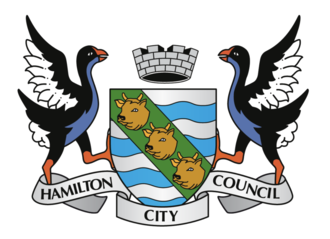

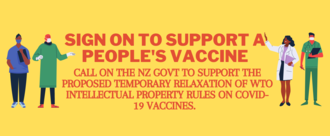.png)
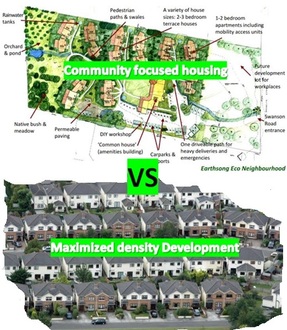
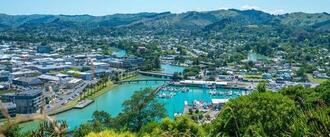.jpeg)
